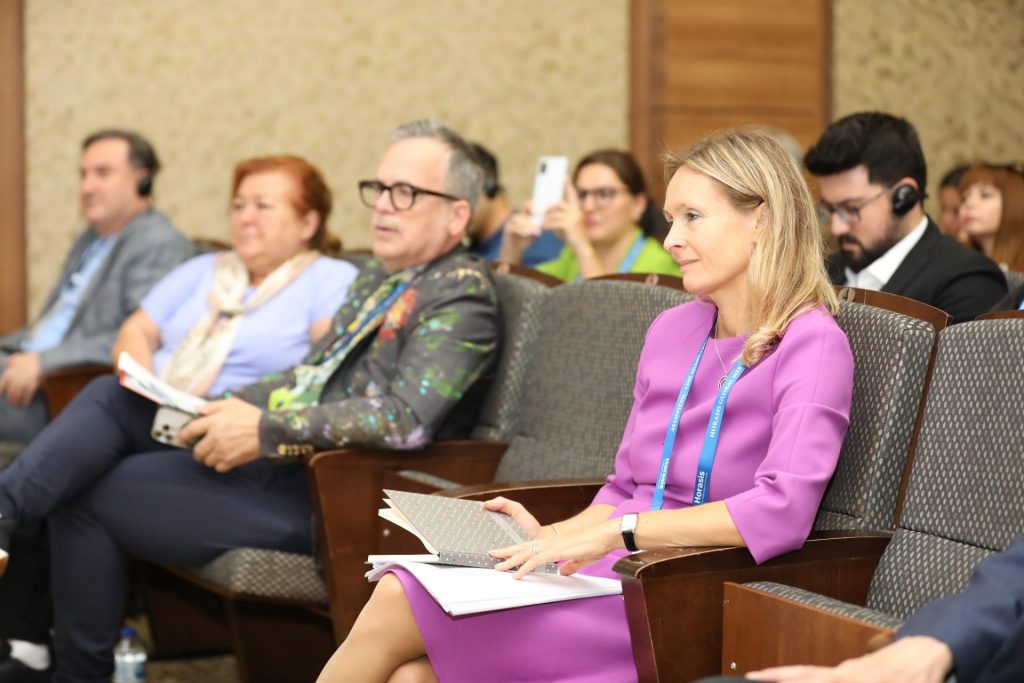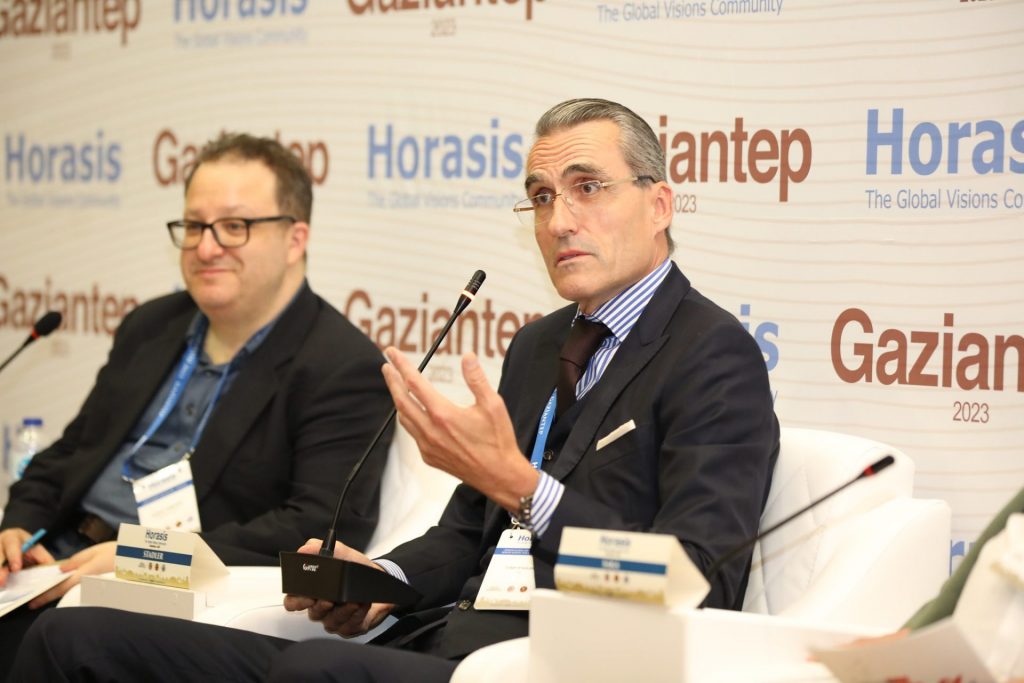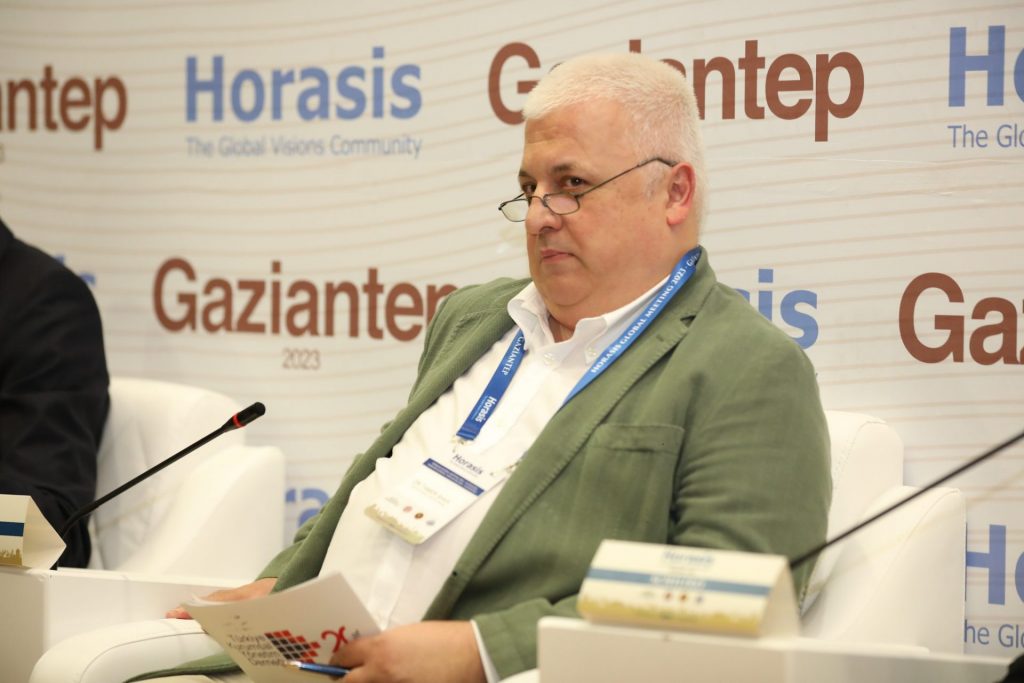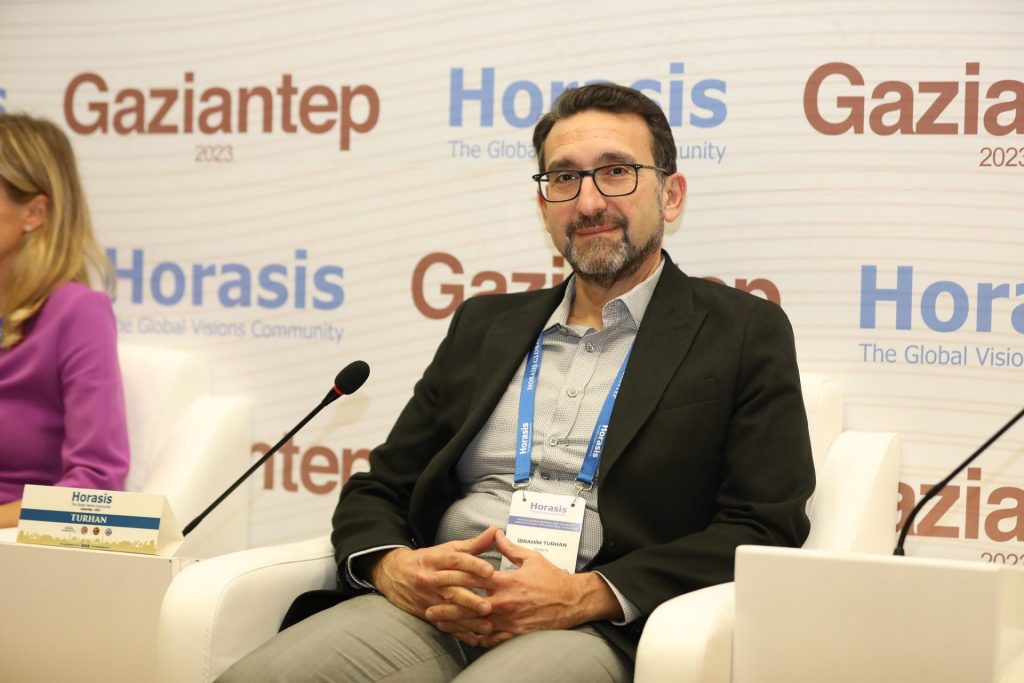Inflation and Market Forces
In my introductory remarks, I argued that, especially after the war in Ukraine, which determined an energy crisis, inflation has become a significant economic issue affecting many countries across the globe. Some, like Türkiye, are experiencing extremely high inflation rates. Today, in Türkiye the inflation rate is over 50 percent, and the Central Bank’s policy rate has reached 35 percent.
Therefore, inflation and the monetary policy decisions made by central banks inevitably impact investors and the composition of their portfolios, as well as the individuals who bear the tax burden. Furthermore, the economic environment is evolving rapidly, which fuels uncertainty, market volatility, and necessitates market forces to make major changes.
Given this uncertain and problematic scenario, I asked Josef Stadler, Vice Chairman, UBS, Switzerland, as an expert banker: How the rise of interest rates by central banks impact the economy and their consequences on inflation?
Stadler’s answer was: Today’s interest levels rise because of perceived inflation, triggered by:
- USD 1 trillion+ COVID program by the Trump and Biden administrations
- Supply chain disrupters
- Ukraine war and higher energy prices
- ‘Buyer strike’ and short positions on USD government bonds due to a raising concern around US creditworthiness. Government intake of USD 4.3 trillion vs 6 trillion spending creating budget deficit of 1.7 trillion in 2023 alone. Interest rates on total debt of 33 trillion at 1 trillion or 25 per cent of total intake! Bond market considers this structural asking for higher yield.

Daniel Zaretsky, President, Bekzod Holding, Uzbekistan
Thereafter, I started asking to the other speakers the following question: How will inflation impact investors and businesses in your industry and your country and how can we maintain a reliable outlook during these uncertain times?
Daniel Zaretsky, President, Bekzod Holding, Uzbekistan, offered an interesting outlook on inflation in Uzbekistan. Analyzing the causes of inflation in that country, he first indicates a significant growth rate of over 6 per cent, which reveals strong market demands. Inflation is also fueled by the liberalization of prices and the increase in incomes. Inflation is favored by the imports of equipment too, where COVID, and the war in Ukraine, among other factors, contributing to the rise in import prices. Trade very probably plays a role. Uzbekistan has Russia as a major partner. Of course, sanctions on Russia and other related issues impact the trading relationship and determine the search of other trading partners with effects on the prices of goods exchanged. Agriculture still represents a large part of the economy in a typically rural society. At the same time, a strong flow of people moved towards the capital Tashkent, since the Propiska system was abandoned, causing a boost in inflation. Russian relocants are on the rise, consequently, food prices are going up, probably they have doubled in the last year. Commodity prices are also going up. Finally, Uzbekistan has a big informal economy, where dollar is used. This has some effects on the price dynamics.
Tamer Saka, Chairman, Corporate Governance Association of Türkiye, Türkiye focused on the challenges faced by companies and investors in Turkey. He highlighted the issues arising from rising inflation, increasing import prices, and production costs, which collectively create significant hurdles for businesses. These challenges include accurately assessing demand and cost factors to manage inflation effectively, adapting to interest rate policies, accounting for the impact of inflation on their balance sheets, and factoring in the devaluation of the Turkish Lira in import and export activities. In summary, the uncertain business environment in Turkey makes efficient operations exceptionally challenging.

Natacha Theytaz, President Turkey, Novartis, Türkiye
Natacha Theytaz, President Turkey, Novartis, Türkiye, discussed the impact of inflation and market forces/regulatory system on the Turkish healthcare system, particularly the pharmaceutical industry. This impact encompasses unsustainable production and operational costs, dynamics in drug pricing, and sadly the negative impact on patients when access to medicines is impaired. Furthermore, she highlighted the ripple effects on research and development, emphasizing the potential setbacks for innovative therapies, if investments are being transferred to other countries due to increasing costs, lack of predictability, as well as less favorable regulatory environment.
Ibrahim Turhan, Founder and Chairperson, Quanta Financial Consultancy, Türkiye started his remakrs from some theoretical considerations about inflation. He argued that “inflation is always and everywhere a monetary phenomenon. We should be clear and define inflation correctly. Inflation is persistent and a significant increase of the general price level. Supply shocks and other cost-side impacts may cause one off price increases, but this is not inflation. Supply side effects will be transformed into inflationary episodes if and only if monetary policy accommodates second run and indirect effects of such shocks. Similarly, should the monetary authority decide to ease the monetary policy and monetize the government deficits, only then high levels of indebtedness will be inflationary.”
A second question I asked the panelists was: How can we explain to the public what has altered their economy and how people can protect themselves from inflation?
Natacha Theytaz highlighted for employees and the broader society the importance of financial literacy to navigate both hyperinflation and currency devaluation. Moreover, negotiating potential wage and salary increases with the company’s workers is challenging in the current situation of hyperinflation in Türkiye, where the inflation rate is above 50 per cent. During the discussion, potential solutions were also shared. Related to healthcare, she mentioned a recent study conducted by McKinsey that has unveiled a remarkable finding – every €1 invested in new medicines yields an impressive economic return of €4. This underscores the importance of considering health as investment not as a cost, also value-based pricing principles can stimulate economic growth. Mrs. Natacha Theytaz also underscored the importance of transparency, predictability, as well as fostering collaboration across diverse range of stakeholders to navigate the volatile environment, emphasizing the need for short- and long-term solutions.

Josef Stadler, Vice Chairman, UBS, Switzerland
Ibrahim Turhan pointed out the role of central banks on inflation and that the consequences of inflation on people are very serious and have strong redistributive effects. He maintained that “Evidence from Turkey during the 1980s and 90s offers a demonstrative example. There was stubborn, chronic inflation simply because the Central Bank of Türkiye (CBT) was not independent. CBT was granted independence, and its mandate was defined as achieving and maintaining price stability in 2001, following a series of crises by the end of the decade, hence the inflation which had been 90 percent over the 1990s, fell to single digit level very quickly. We witnessed even once the annual consumer inflation rate in Türkiye was below the one in the UK (March 2011). Furthermore, inflation is an unlawful tax, and it causes significant transfer of wealth from the lower income groups to the richer. There are several indicators suggesting that global inflation level will remain high for an extended period of time.
Daniel Zaretsky continued to analyze the inflation situation in Uzbekistan, proposing potential solutions to alleviate the price increases that are negatively affecting the lives of the population. Solutions include implementing a monetary policy designed to control inflation, with a target not exceeding 5 per cent next year, thereby tightening the money supply and imposing limits on borrowing. Additionally, reducing the chances of corruption can be achieved through the digitalization of government activities, which can also lead to decreased business costs. Implementing regulatory price reforms, especially for energy and water prices. Additionally, enhance energy infrastructure, increase the efficiency of state-owned enterprises (SOEs), and expedite the privatization process.

Tamer Saka, Chairman, Corporate Governance Association of Türkiye, Türkiye
Josef Stadler underlined that inflation is like cancer. He stated: “Unless you fight it vigorously the metastasis will destroy the economy, as it slowly but steadily erodes confidence. On top inflation is an unwanted/illegitimate tax on the poor. You have to slow the economy and that hurts. You can do it via ‘shock and awe’ or you do it in a more civilized way but over a longer period. Neither strategy brings you voters or a majority. That’s why the rulers tend to sit it out. That’s why inflation is so sicky. You have to kill it at the source: stop overspending. The Swiss have shown how to do it: you introduce a provision in the constitution that prevents the government to spend more than the intake. That simple. No question, no prisoners”.
Tamer Saka observed that hyperinflation in Türkiye is a huge problem for the public. It deeply affects people, especially millions of individuals from the middle class whose median salary is about $500 US dollars, and those earning minimum wage who struggle to cover food and energy costs. He expressed hope that the Central Bank of Türkiye will be able to control inflation and that the government will implement policies to help people overcome this challenging economic situation in the country.

Ibrahim Turhan, Founder and Chairperson, Quanta Financial Consultancy, Türkiye
The panel proceeded to open a discussion with the numerous audience members who attended the event. Several questions were asked, and among them, a Turkish businessman inquired of Mr. Stadler when Turkey would be allowed to join the EU. Mr. Stadler responded by asking, “Why should this be desirable in the first place? EU membership would mean money against loss of independence”.
By Daniele Schilirò, Professor, University of Messina, Italy




